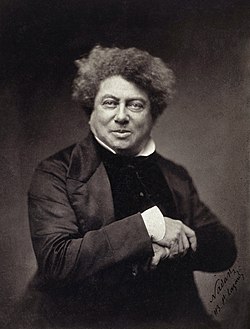Alexandre Dumas Quote
No, Maximilien, I am not offended, answered she, but do you not see what a poor, helpless being I am, almost a stranger and an outcast in my father's house, where even he is seldom seen; whose will has been thwarted, and spirits broken, from the age of ten years, beneath the iron rod so sternly held over me; oppressed, mortified, and persecuted, day by day, hour by hour, minute by minute, no person has cared for, even observed my sufferings, nor have I ever breathed one word on the subject save to yourself. Outwardly and in the eyes of the world, I am surrounded by kindness and affection; but the reverse is the case. The general remark is, `Oh, it cannot be expected that one of so stern a character as M. Villefort could lavish the tenderness some fathers do on their daughters. What though she has lost her own mother at a tender age, she has had the happiness to find a second mother in Madame de Villefort.' The world, however, is mistaken; my father abandons me from utter indifference, while my mother-in-law detests me with a hatred so much the more terrible because it is veiled beneath a continual smile.
No, Maximilien, I am not offended, answered she, but do you not see what a poor, helpless being I am, almost a stranger and an outcast in my father's house, where even he is seldom seen; whose will has been thwarted, and spirits broken, from the age of ten years, beneath the iron rod so sternly held over me; oppressed, mortified, and persecuted, day by day, hour by hour, minute by minute, no person has cared for, even observed my sufferings, nor have I ever breathed one word on the subject save to yourself. Outwardly and in the eyes of the world, I am surrounded by kindness and affection; but the reverse is the case. The general remark is, `Oh, it cannot be expected that one of so stern a character as M. Villefort could lavish the tenderness some fathers do on their daughters. What though she has lost her own mother at a tender age, she has had the happiness to find a second mother in Madame de Villefort.' The world, however, is mistaken; my father abandons me from utter indifference, while my mother-in-law detests me with a hatred so much the more terrible because it is veiled beneath a continual smile.
Related Quotes
About Alexandre Dumas
His works have been translated into many languages and he is one of the most widely read French authors. Many of his historical novels of adventure were originally published as serials, including The Count of Monte Cristo, The Three Musketeers, Twenty Years After and The Vicomte of Bragelonne: Ten Years Later. Since the early 20th century, his novels have been adapted into nearly 200 films. Prolific in several genres, Dumas began his career by writing plays, which were successfully produced from the first. He wrote numerous magazine articles and travel books; his published works totalled 100,000 pages. In the 1840s, Dumas founded the Théâtre Historique in Paris.
His father, General Thomas-Alexandre Dumas Davy de la Pailleterie, was born in the French colony of Saint-Domingue (present-day Haiti) to Alexandre Antoine Davy de la Pailleterie, a French nobleman, and Marie-Cessette Dumas, an African slave. At age 14, Thomas-Alexandre was taken by his father to France, where he was educated in a military academy and entered the military for what became an illustrious career.
Alexandre acquired work with Louis-Philippe, Duke of Orléans, then as a writer, a career that led to his early success. Decades later, after the election of Louis-Napoléon Bonaparte in 1851, Dumas fell from favour and left France for Belgium, where he stayed for several years. He moved to Russia for a few years and then to Italy. In 1861, he founded and published the newspaper L'Indépendent, which supported Italian unification. He returned to Paris in 1864.
English playwright Watts Phillips, who knew Dumas in his later life, described him as "the most generous, large-hearted being in the world. He also was the most delightfully amusing and egotistical creature on the face of the earth. His tongue was like a windmill – once set in motion, you would never know when he would stop, especially if the theme was himself."
